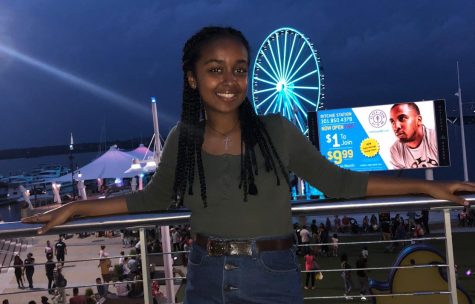Immigrant stories: Coming to America
Maisha Maliha was only five months old when she first came to America from Bangladesh. She traveled by plane for 13 hours, and first arrived to D.C, with her mom.
Since she was young, she did not have any memories of her own about coming here, but she remembers stories from what her mom told her.
“I remember my mom telling me that we had planned to land in New York, but it was the same day that the twin towers were knocked over,” Maliha said.
It was unknown if other attacks were going to happen, so planes had to take a detour in order to keep the passengers safe.
“We ended up landing in Boston instead, and made our way down from there,” Maliha said.
Her father was already a citizen in America, so when her parents married, the process of coming to America wasn’t as complicated as it is for most people.
Once her and her mom had landed in Boston, Maliha then made her way to D.C. and began her life in America.
For some people, trying to fit in to a new surrounding can be hard to adapt to, but the situation was different for Maliha.
“Thankfully when I was in D.C., my school was relatively diverse already, so trying to fit in was not very hard for me,” Maliha said.
Compared to schooling in Bangladesh, one major difference Maliha noticed was that teachers were the ones who would move around from class to class, as opposed to students moving around.
Since coming to America, Maliha has gone back to Bangladesh on two occasions.
“When I first went back to Bangladesh, I was 14 years old. It was to attend a bunch of weddings. Three of my cousins got married, and weddings in Bangladesh are a long process,” Maliha said.
In Bangladesh, a typical wedding has three different events tied to it, which kept Maliha busy on her trip.
“In total, I ended up attending nine events in my two weeks there. I wasn’t able to fully enjoy the country through, ” Maliha said.
One main difference between America and Bangladesh that Maliha recalled was the traffic laws. Despite there being traffic lights in Bangladesh, little to no people would actually use them to navigate through the streets.
“When driving around in Bangladesh, there aren’t distinguishable lines on the streets when driving, so people are just weaving around. It gets very dangerous,” Maliha said.
In spite of that, she still would like to return to Bangladesh soon with her family if they go back again.
“I would love to be able to see my family again next summer, I miss my family back home,” Maliha said.
After being in America for many years, Maliha is very thankful for the opportunities that she has here in America.

Senior Yabi Bereket has been on the A-blast for four years. This year, she is the International Editor and has previously been editor for the Lifestyles...







